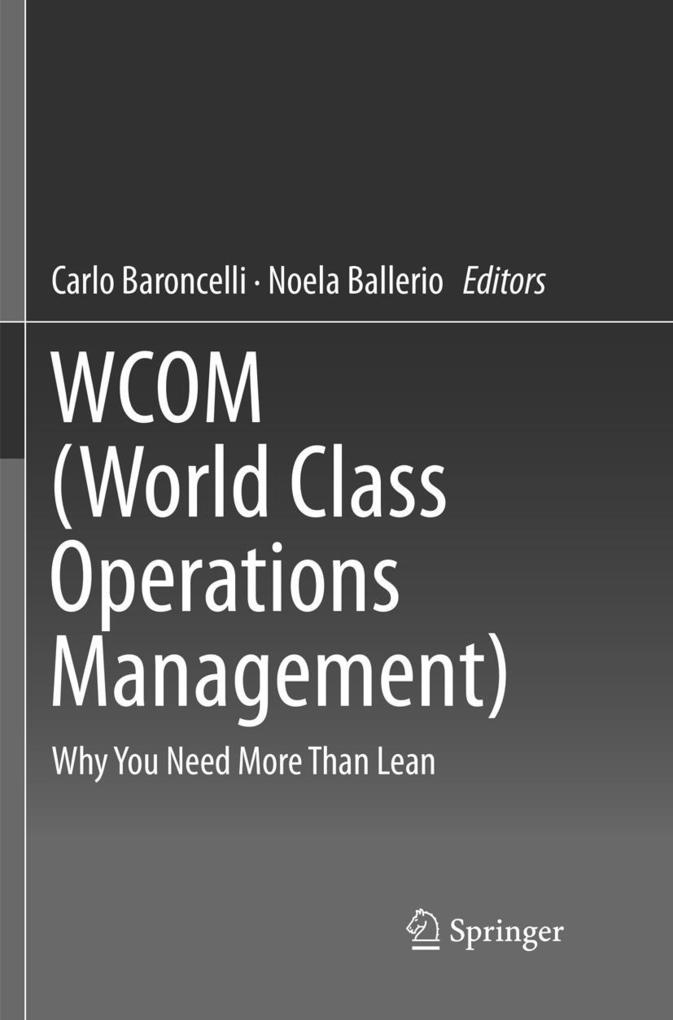
Zustellung: Sa, 07.06. - Mi, 11.06.
Versand in 2 Tagen
VersandkostenfreiBestellen & in Filiale abholen:
This book deals with World Class Operations Management (WCOM), detailing its principles, methods and organisation, and the results that this approach can bring about. Utilising real-world case studies illustrated by companies that have adopted this model (interviews with Saint-Gobain, L'Oréal, Tetra Pak, Bemis, and Bel Executives), it describes common patterns drawn from decades of hands-on experience, so as to present a theoretical approach together with the concrete application of its principles.
WCOM, adopted by several multinational companies, is one of the more innovative management practises, as it integrates the best Continuous Improvement approaches (Lean, Total Productive Management, World Class Manufacturing) as well as the most innovative approaches in human dynamics like Change Leadership, Performance Behavior, Shingo Model, to name a few. Every book's chapter has been authored by an expert in these different fields, thus revealing the synergy among the different practices, which is one of the distinguishing and successful aspects of WCOM
Maximising reader insights into the successful implementation of such an approach, and explaining not only its potentialities, but also its implementation dynamics, the critical points and the ways it can be integrated into different situations, this book is also about how to create a culture of excellence that is sustainable over a long period of time and delivers consistent (or ever-improving) results.
Inhaltsverzeichnis
Preface. - Foreword. - Introduction. - Part 1. Cases and Best practices. - 1. 1 The Bel Boost case. - 1. 2 The Bemis WCM case. - 1. 3 The L Oréal WCM case. - 1. 4 The Saint-Gobain WCM case. - 1. 5 The Tetra Pak WCM case. - Part 2. The WCOM Model. - 2. 1Intro to WCOM , why & what: the loss concept. - 2. 2Strategy Deployment. - 2. 3 The three phases of WCOM . - 2. 4 The WCOM Organisation. - 2. 5 WCOM in Research and Development. - 2. 6 WCOM in Supply Chain. - 2. 7 WCOM in Procurement. - 2. 8 WCOM in Business Process . - 2. 9 Implementation. - 2. 10 History of TPM and JIPM: The TPM Awards from the Japan Institute of Plant. - Part 3. The Human side. - 3. 1The human dynamics in WCOM . - 3. 2Change management and leadership. - 3. 3Performance Behavior. - 3. 4The Shingo Model. - 3. 5TWI. - 4. Conclusion. - 4. 1Key Patterns of a Common Approach. - Annex: the Value Chain Pillars in brief. - About the authors. - Acknowledgements.
Produktdetails
Erscheinungsdatum
27. Mai 2018
Sprache
englisch
Auflage
Softcover reprint of the original 1st edition 2016
Seitenanzahl
296
Herausgegeben von
Carlo Baroncelli, Noela Ballerio
Verlag/Hersteller
Produktart
kartoniert
Abbildungen
XXIV, 271 p. 95 illus., 94 illus. in color.
Gewicht
452 g
Größe (L/B/H)
235/155/17 mm
Sonstiges
Previously published in hardcover
ISBN
9783319807256
Entdecken Sie mehr
Bewertungen
0 Bewertungen
Es wurden noch keine Bewertungen abgegeben. Schreiben Sie die erste Bewertung zu "WCOM (World Class Operations Management)" und helfen Sie damit anderen bei der Kaufentscheidung.









